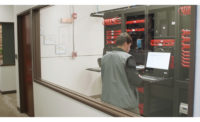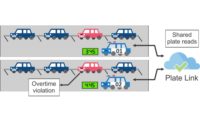
|
| Jeff Wooten, president of Data Link Communications, attributes much of his company’s success to its background in structured cabling and IT, which he feels gave the company a leg up when it entered the IP security space nearly a decade ago. |
In July, Evansville, Ind.-based Data Link Communications will begin work on upgrading the existing IP video system at Cincinnati/Northern Kentucky International Airport, which will include replacing an antiquated storage platform that wasn’t working well for the airport with new high-capacity Big Bertha servers from BCDVideo. So how did a company that got its start in low-voltage cabling and paging/telephone systems find itself taking on such a large and high-profile surveillance project? That’s a good question. And the answer has a lot to do with recognizing — and seizing — opportunities. Especially those that may have been overlooked by others, which is exactly what the airport’s prior integrator did.
After starting out in low-voltage cabling in the late ‘90s and diversifying into paging and telephone systems shortly afterward, Data Link got into security in the mid-2000s. At the time, Jeff Wooten, president of Data Link, says, the company had to make a choice: get into voice over IP or pursue opportunities in other areas, including IP security.
Anixter, Data Link’s distributor, played a large part in the decision to enter the security game. Wooten says Anixter’s people periodically talk about trends and what’s driving the distributor’s business, and at the time Data Link reached that crossroads, IP security was a big opportunity, Wooten says.
“They talked about how they were ramping up their business in IP. We weighed the options of other systems and security and realized that we were already pulling cable, and we already had the equipment and the know-how,” he said.
And Data Link hasn’t looked back.
“Today, about 80 percent of our business is security; for the first time in my life I was ahead of the curve on something,” Wooten noted.
And while security is the main business for Data Link, the company often creates additional opportunities for itself by finding creative, often non-security uses for the technologies it sells and installs.
“We always speak about the openness in IP security products, but it’s not just security. We think out of the box and ask, ‘What could we use it for?’” Wooten said. “With existing technologies, we’re trying to find other avenues to find more business for ourselves. We’re not just looking at security.”
One example is a large auto manufacturer customer of Data Link’s, whose maintenance department had a predicament. Every time something went wrong with the machinery, technicians had to sit (sometimes for hours) and watch, waiting for the machine to repeat the problem. By incorporating additional cameras into the existing security system, the customer was able to see in real time when something was happening, and could also go back to see what happened — eliminating that time technicians were losing just sitting and waiting, while saving a sizable chunk of change in the process.
“They were losing $20,000 an hour while the technicians were just sitting there, so eliminating one downtime paid for the whole system,” Wooten explained. “We started with four cameras, and now they have over 160 cameras just watching machinery. It’s been that positive.”
Opportunities lurk everywhere, Wooten said, even in something that may seem as mundane as a firmware or software update.
“There’s an opportunity every single time the manufacturer’s software is upgraded to talk with customers and tell them about the new features they’re going to be getting and how they’re going to solve their issues — and maybe pull some sales,” Wooten commented. “With IP, you’re always refreshing software to solve common problems.”
The company is opening a second office in Cincinnati, where it already has five technicians on the ground to work on a new hospital construction project that will involve automating credentials so that when someone is entered into the HR software, they’re automatically entered into the S2 access control system, as well as several other aspects.
True to form, Data Link managed to seize the opportunity to expand the scope of the project to include retrofitting the company’s other six hospitals and integrating them all into one enterprise system, rather than seven separate access control systems.
“This is a corporate environment, so people change locations daily. With this system, they’ll be able to grant access rights across all seven locations in about 15 seconds,” Wooten said.
While it makes quick sales impossible, education has played a major role in the double-digit growth Data Link has experienced nearly every year since getting into security, Wooten added.
“Our sales cycle is a little slower with IP because we take the time to explain to customers that this is a scalable system, and here’s what it can do today. And as you grow, there are all these other features you can take advantage of,” Wooten said.









